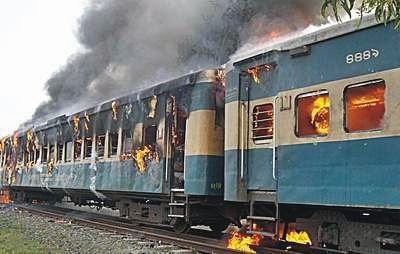Rail tracks, the BNP and Spain

Photo: STAR
There are all sorts of bizarre things happening in our ageing world. And our world is, of course, the unfortunate, battered country we happen to inhabit. Observe. The BNP would have us know that its student wing had applied for permission to hold its rally at Ullapara of Sirajganj but then had to shift its premises because the ruling Awami League too planned its own meeting there.
If the Awami League was very well aware of the planned rally by the Jatiyotabadi Chhatra Dal, why did it not move its own rally to some other venue? This question is now academic, of course, for tragedy is already upon us. A speeding train has mown down a crowd, killing at least five persons and leaving many others badly injured. The train itself has been torched. Politics, if you must now, has taken a turn for the worse.
Whatever will happen next? We lurch from one uncertainty to the next, from one tragedy to the next appalling tragedy. We were outraged by the sight of all those Awami League goons beating a BNP man to death a few days ago. Today, we might as well condemn all those men who put the lives of so many individuals in danger by having them crowd the railway tracks in Sirajganj. And we condemn those who set the train afire, putting the lives of its passengers at risk. You call this politics? Politics is a good deal more than that. There is the sublime about it. Nothing was sublime in or about Sirajganj.
One would have thought Khaleda Zia, as a former prime minister, as leader of the opposition, as the widow of the man her supporters respect beyond measure, would be as shocked as we are by what her followers caused on those rail tracks. That she did not hint at the slightest bit of shock in her, that indeed she thinks it was all part of a ruling party conspiracy to have that train ram into that mob to weaken the opposition makes you wonder which way the Bangladesh Nationalist Party is going.
It is going the wrong way. It has refused to go into soul-searching over its defeat at the last elections. When a whole nation condemns the thievery its leading lights indulged in --- and that was in their glory days --- it continues to regard these people as symbols of its future, and also ours. A pity.
When the former prime minister feels unhappy about the upcoming war crimes trial of the collaborators of the Pakistan occupation army, you are inclined to ask why she must take it upon herself to defend those who caused so much misery for us back when we were struggling to free ourselves of Pakistan. Doesn't she and doesn't the BNP remember the three million Bengalis who died in 1971? Don't they recall the images of the putrefying corpses of Bengali intellectuals, all murdered by the goon squads of the Jamaat-e-Islami, in Rayerbazar?
That the BNP has in a large way been a platform for a good number of anti-Liberation elements to rehabilitate themselves has never been in question. That the founder of the party saw nothing wrong in tampering with the constitution and that he was happy to have the killers of Bangabandhu and the four national leaders strut around as heroes rather than as the despicable criminals they were is a truth no one, not even the "Bangladeshi nationalists," will deny. And yet there are the lessons of history the BNP could have gone through.
In Spain, following the demise of Generalissimo Francisco Franco, his followers were brave enough to understand the need for reforms among themselves. They banded together, embraced the democratic process that took shape in the aftermath of Franco's death and went on to contribute to a strengthening of Spanish pluralism.
The BNP ought to have done a similar thing long ago. By continuing to be arrogantly proud of its past, by going disconsolate every time it has lost an election, it has shown itself incapable of coming to terms with the future.
Begum Zia has just exhorted us to be ready to lay down our lives. Whatever for? Simple. To get the government we elected less than two years ago out of power and so out of her way. She has reminded the country of her struggle against General Ershad, the obvious point being to prepare them for a similar movement against Sheikh Hasina.
It is bad politics. And here are the reasons. First, the former prime minister carefully stops short of informing people that not long ago it was Ershad she forged an alliance with to keep the Awami League out of power. Selective politics is bad for a party, terrible for its leaders. You heap the old abuse on Ershad but you seal your lips when it comes to the camaraderie you enjoyed with him.
And now for the second reason: mixing up the Ershad dictatorship with Sheikh Hasina's elected government is as good as misconstruing the entire purpose of politics. Worse, it is a clear sign of how a party, inconsolably unhappy at being in the opposition, can in its desperation push a nation into dangerous, uncharted territory.
The Bangladesh Nationalist Party must change, in more ways than one. Now that two notorious amendments to the constitution are finally in shreds, it must do what those Francoists did in Spain. It must reform, enough to convince the country it can provide positive leadership to it.

 For all latest news, follow The Daily Star's Google News channel.
For all latest news, follow The Daily Star's Google News channel. 




Comments